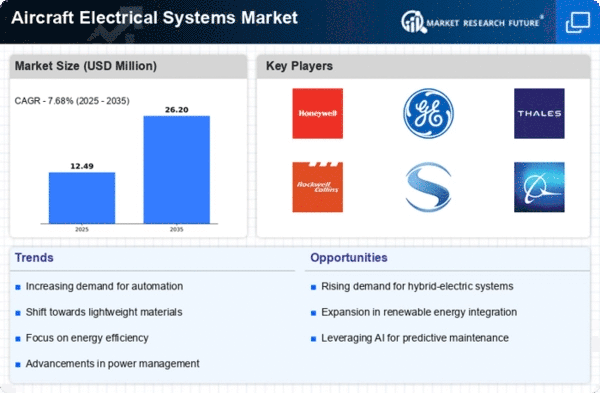Top Industry Leaders in the Aircraft Electrical Systems Market

Aircraft Electrical Systems Market :
The Aircraft Electrical Systems Market has witnessed significant growth in recent years, driven by advancements in aviation technology and the increasing demand for more efficient, reliable, and technologically advanced aircraft. The competitive landscape of this market is dynamic and multifaceted, reflecting a blend of established players, emerging companies, and innovative startups. The key players in this sector continually strategize to gain a competitive edge, considering factors such as market share analysis, industry trends, and investment patterns.
Key Players:
Safran (France)
AMETEK, Inc. (US)
Esterline Technologies (US)
GE Aviation (US)
Astronics Corporation (US)
Honeywell International Inc. (US)
Thales Group (France)
Raytheon Technologies Corporation (US)
Meggitt (UK)
Amphenol Corporation (US)
Strategies Adopted: To maintain and enhance their competitive positions, key players deploy various strategies. One common approach is research and development (R&D) investment to create cutting-edge technologies. For instance, Boeing and Airbus consistently invest in the development of more efficient electrical systems to improve aircraft performance and reduce environmental impact. Additionally, strategic partnerships and collaborations are prevalent in the market. Companies often form alliances to pool resources, share expertise, and collectively address industry challenges. Honeywell's collaboration with smaller companies for niche technologies exemplifies this trend.
Factors for Market Share Analysis: Market share analysis in the Aircraft Electrical Systems Market involves considering several factors. Innovation and technological advancements play a crucial role, as companies offering state-of-the-art solutions tend to capture a larger market share. Additionally, reliability and safety are paramount in the aviation sector, making the certification and compliance of electrical systems with industry standards a significant factor for market share. Cost-effectiveness and efficiency are also critical considerations, as airlines and aircraft manufacturers seek systems that provide optimal performance while minimizing operational expenses.
New and Emerging Companies: While established players dominate the market, new and emerging companies contribute to its vibrancy. Startups like Electric Power Systems (EPS) and Magnix focus on niche areas, such as electric propulsion systems and electric aircraft. These companies aim to disrupt traditional norms, offering innovative solutions that align with the aviation industry's evolving needs. The agility and fresh perspectives of these newcomers challenge the status quo, fostering competition and driving the industry towards further innovation.
Industry News: Industry news in the Aircraft Electrical Systems Market often revolves around technological breakthroughs, regulatory developments, and major contracts. For example, news of a collaboration between Airbus and a leading avionics company to develop more energy-efficient electrical systems for future aircraft can influence market dynamics. Regulatory changes, such as updated safety standards or environmental requirements, can prompt companies to adjust their strategies and offerings to comply with new norms. The industry closely monitors such developments, as they can have a profound impact on market dynamics.
Current Company Investment Trends: Investment trends in the Aircraft Electrical Systems Market reflect the industry's focus on innovation and sustainability. Companies are increasingly investing in research and development to create greener, more energy-efficient electrical systems. Electric propulsion systems, in particular, have garnered significant attention and investment, with companies exploring ways to reduce the environmental footprint of aviation. Additionally, investments in digitalization and connectivity solutions are on the rise, as the aviation industry embraces the era of smart aircraft and data-driven operations.
Overall Competitive Scenario: The overall competitive scenario in the Aircraft Electrical Systems Market is characterized by intense rivalry, innovation-driven differentiation, and a focus on sustainability. Established players leverage their brand reputation, global presence, and extensive product portfolios to maintain a stronghold. Simultaneously, new entrants and emerging companies challenge the status quo by introducing disruptive technologies and business models. The push towards electric and hybrid-electric aircraft further intensifies competition, as companies strive to position themselves as leaders in this transformative era of aviation.
The Aircraft Electrical Systems Market is a dynamic and competitive landscape, shaped by the strategies adopted by key players, the emergence of new companies, industry news, and current investment trends. Established giants like Boeing and Airbus maintain their dominance through continuous innovation and strategic collaborations. The market also welcomes new and emerging players, often startups, bringing fresh perspectives and disruptive technologies. Market share analysis is influenced by factors such as innovation, reliability, compliance with regulations, and cost-effectiveness. As the industry embraces sustainability and digitalization, companies are strategically investing in R&D to stay ahead in this rapidly evolving sector. The overall competitive scenario reflects an industry in transition, with established norms being challenged, and a new era of aviation on the horizon.
Recent News :
Boeing and Safran Sign Multi-Year Contracts for Electrical Wiring: In March 2022, Boeing and Safran entered into multi-year contracts for the supply of electrical wiring for various Boeing aircraft models, including the P8, B787 Dreamliner, B767-2C, B767 Freighter, B737 MAX, B777, and B777-X. This partnership highlights the increasing demand for electrical systems in modern aircraft.











